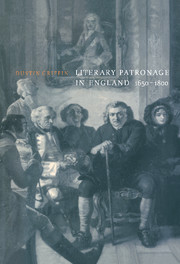Book contents
- Frontmatter
- Contents
- Acknowledgments
- 1 Introduction
- 2 The cultural economics of literary patronage
- 3 The politics of patronage
- 4 John Dryden
- 5 Jonathan Swift
- 6 Alexander Pope
- 7 Edward Young and Richard Savage
- 8 Mary Leapor and Charlotte Lennox
- 9 Samuel Johnson
- 10 The persistence of patronage
- 11 Conclusion
- Bibliography
- Index
7 - Edward Young and Richard Savage
Published online by Cambridge University Press: 22 August 2009
- Frontmatter
- Contents
- Acknowledgments
- 1 Introduction
- 2 The cultural economics of literary patronage
- 3 The politics of patronage
- 4 John Dryden
- 5 Jonathan Swift
- 6 Alexander Pope
- 7 Edward Young and Richard Savage
- 8 Mary Leapor and Charlotte Lennox
- 9 Samuel Johnson
- 10 The persistence of patronage
- 11 Conclusion
- Bibliography
- Index
Summary
Patronage flowed not only to the great writers of the day, but to those whom we now think of as marginal. The careers of Edward Young (1683–1765) and Richard Savage (1697–1742) are worth reexamining, if only to revise the myths, fostered by the poets themselves, that they were neglected by the patrons of the day. In fact, though they complained bitterly, both were well rewarded. Furthermore, Young was in fact rather less obsequious than we have thought, and Savage rather more fawning.
EDWARD YOUNG
Young is often described as the archetypal literary careerist – opportunistic, self-promoting, shamelessly ready to provide lavish praise in exchange for pension or preferment. Long before George Eliot's famous attack in 1857, in “Worldliness and Otherworldliness: the Poet Young,” he was damned for hypocrisy, for pretending to celebrate unworldly retirement and otherworldly hopes while desperately soliciting worldly advantage. That he was an avid solicitor of the patrons of the day is undeniable. But it is too hastily assumed that he was unusual in his obsequiousness. In fact, Young's practice as a dedicator is consistent with the standards of his day. When he made his literary debut during the last years of Queen Anne's reign, both Whig and Tory writers found numerous paths to preferment. Young chose the Tory rather than Addison's Whiggish route, publishing the panegyrical Epistle to the Right Honourable George Lord Lansdowne in 1712 and The Last Day, dedicated to the queen, in 1713.
- Type
- Chapter
- Information
- Literary Patronage in England, 1650–1800 , pp. 155 - 188Publisher: Cambridge University PressPrint publication year: 1996



